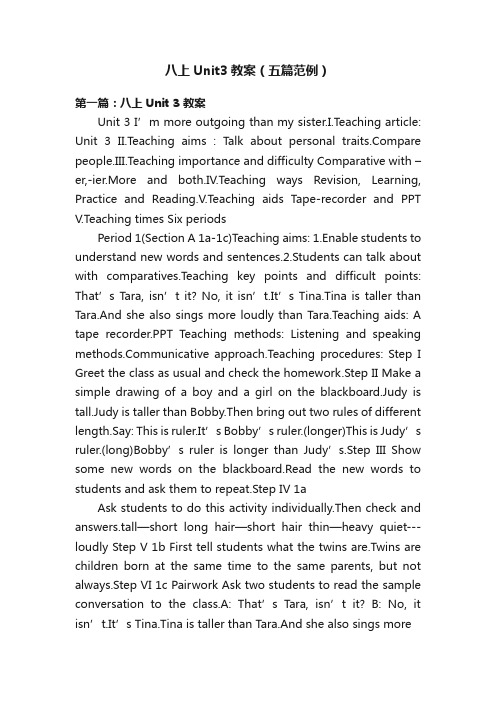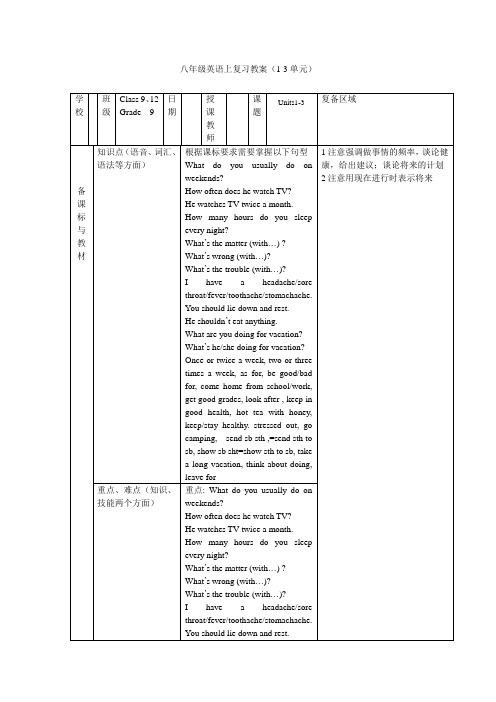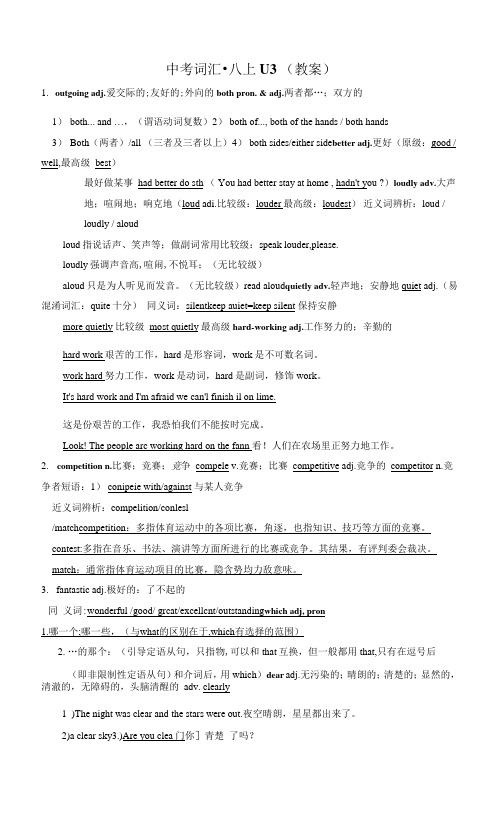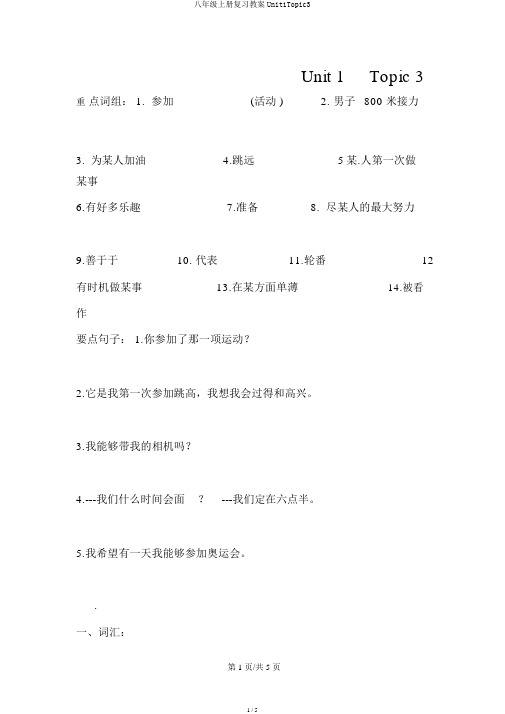2017中考英语一轮第5讲八上Unit 1-Unit 3复习教案
人教版初三第一轮复习八年级上册Unit 1复习教学案(无答案)

_________学校 8 年级上册英语Unit 1 复习教学案总第课时课题Unit 1 Book 8A 课时授课日期课型复习课主备教师审核人教学目标1.能掌握这个单元的单词、重点短语2.能掌握这个单元的重点句型1.Did you buy anything special?2.It was sunny and hot,so we decided to the beach near our hotel.3.My sister and I tried paragliding.教学重点能掌握这个单元的单词、重点短语;能掌握这个单元的重点句型。
教学难点能掌握不定代词用法及一般过去时。
教学设计Step 1 单词复习(5minutes)学生齐读或自读Unit 1单元单词并记忆Step 2单词检测(5 minutes )见《中考新航线》P13. 重点单词和重点短语(左边内容)Step 3 课本梳理(15-20 minutes )师生共同梳理Units 1的课文,注意课文中的重点词汇、句型,可参照《中考新航线》(厚)P14-15考点一至考点五。
一、重点短语1.相当多,不少____________ 2.给……的感觉,感受到____________3.因为____________ 4.几乎从不____________5.至少,不少于,起码____________ 6.例如,像……这样____________7.多于____________ 8.少于____________二、知识梳理try的用法【考点抢测】1.We'll ________(设法改进) our teaching methods.2.Let's ________(试着敲门) at the back door.3.I would like the new coat,can I ________it ________(试穿)?4.(2015湘潭模拟试题)I'll ________it ________(试验或试用) and see if itworks.5.(2015益阳中考模拟)Maybe you can carry the box,please ________(试一试).【满分点拨】try——try to do sth.意为“尽力、设法做某事”,强调付出一定的努力二次备课—try doing sth.意为“尝试做某事”,但不一定付出很大努力—(1)try构成的其他搭配:try on试穿try one's best尽最大努力(2)try作名词,意为“尝试”,have a try试一试enough的用法【考点抢测】6.That bicycle is ________(足够大) for me.7.In the old days,lots of people didn't have ______(足够的食物) to eat and money to send their children to school.8.(2015常德中考模拟)Five people will be quite ________(足够完成) the work.【满分点拨】enough的用法enough作形容词时,置于名词前、后均可作副词时,置于所修饰的形容词、副词之后【巧学妙记】enough在句中的位置修饰名词很自由,可以前来也可后;若是修饰形或副,一定后置要记住。
人教版初三第一轮复习八年级上册Unit 3 复习教学案(无答案)

_________学校 8 年级上册英语Units 3 复习教学案总第课时The first class on CCTV—1 continued throughout September 1,2008.The program was made by CCTV and Ministry of Education. It had been students' constant companion for the last six years. The new topic performed this term is “Parents taught me”.In this class,not only children but also parents became the focus. Parents taught us by using their personal examples which benefited us a lot. In my opinion,both family education and school education play a very important role. The children are affected by their parents during their growth. Every word and action of the parents,will affect the children. As parents,they must give the children a good environment for their growth,must be strict selfdiscipline,set a good example to their children. Teach children to correctly judge things,guide the children to grow healthily. Now every family generally have a child,the child's childhood education is every parents' responsibility,after all parents are the first teachers of the children. For the healthy growth of children,hope all parents can set up the correct words and deeds,for children to make them proud. Of course,children should give courage,compassion(怜悯) and dedication(奉献) in return. ()1.The program The first class on CCTV—1 started in ________.A.2008B.2014C.2010()2.What's the topic of 2014 first class?A.School education.B.Students' constant companion.C.Parents taught me.()3.________ entered the class and played a very important role.A.Teachers and studentsB.Doctors and patientsC.Parents and children()4.The underlined word “judge” means ______.A.判断B.考虑C.解决()5.According to the passage,the writer mainly tells us ________.A.The first class on CCTV—1 continued throughout September 1,2008.B.Family education plays a very important role.C.The children are affected by their parents during their growth.Step 7. 课后作业《随堂同步训练》P 159必做:五、完型填空;八、书面表达。
英语中考一轮复习八年级上学期学案(最新编写)

C. until
D. as
4. (2010 山东菏泽 )I ’m sorry, I didn ’t ______you clearly. Would you say it again?
A. hear
B. notice
C. see
D. watch
5. (2011 江苏南京 )Most parents don’t think it is __________(health) for children to stay up too
( )3. L uckily, the boy didn ’ t hurt his
in the accidentt, so he can walk as usual .
A. arms
B.legs
C. eyes
D.hands
( )4. I learned a lot form my cousin , I ’ m 5 years older than her .
it 用作形式主语的用法 不定式作主语往往用形式主语的不定式后置。常用句型:
It's+adj.+for sb.to do sth
【学以致用】
( 7) It’ good______others when they are in trouble
A.helping
B.to help
C.help
D.helps
A. If
B.Unless C.because
D.Although
考点三— What’ the matter?— I’ m not feeling well 。我觉得不舒服( P9 Unit 2 )
询问病情的句型以及感官动词 feel 的用法 What ’ the matter ( with sb.) ?=What ’ wrong/the trouble (with sb.) ? 用于询问 "( 某人 ) 怎么了,哪不舒服出了什么事 " ,作为宾语从句是语序不变。 【考点拓展】 感官动词 feel 可用来表示“摸起来” ,后常跟 形容词 作表语,类似用法还有: look (看起来) sound(听起来), smell (闻起来), taste(尝起来)等。
中考第一轮教材复习 仁爱版八年级上册 Unit3导学案

中考第一轮教材复习 仁爱版八年级上册Unit 3导学案Unit 3 Our Hobbies第一课时Topic 1 What hobbies did you used to have?一、课前自我复习要求1.复习课本八上Unit 3,Topic1所有单词,尝试在《仁爱版八年级上期单词检测卡》上默写。
2.朗读课本八年级上册Unit 3,Topic1,重点掌握reading很grammar focus中的句型。
二、课堂复习过程一.按要求写单词1.hobby复数2.activity复数3.interested名词4.recite现在分词5.swim名词6.sing名词7.paint名词、8.value形容词 9.teach过去形式10.autumn同义词 11.day形容词 ually形容词13.keep过去、 zy反义词 15.friendly反义词16.beautiful反义词 17.change现在分词 18.clever反义词二.词组及短语1.在某人空闲时间2.对……感兴趣3.喜欢4.等待 4.电影迷 6.电影院7.户外运动8.随着音乐跳舞9.背诗10.遛狗11.集邮 12.种花13.制作飞机模型14.去徒步旅行 15.去爬山16.非常有价值17.摇滚乐 18.电影迷19.电影院20.流行音乐 21.在我家前面22. 去滑旱冰 23.养宠物_______________ 24.在池塘里25.放风筝26.网上聊天________________ 27.洗澡28.在暑假期间29. 康复 30.一直二.重知识点1.只能接动名词而不能接不定式作宾语的动词有enjoy, finish, avoid, be busy, mind, practice, go on, give up, miss, feel like等。
1). He wanted to give up (study) English but he couldn’t, because English isvery important.2). He missed (watch) the soccer game. He feels sorry.3). They were busy (sweep)the floor when I left.4). After dinner, he went on (write) his novel. 5). He doesn’t feel like (eat) anything.6). When did you finish (read) the book?7). I often practice (speak) English with my classmates?8). The teacher kept me (stand) for a whole class.2.有的动词后即可以接动名词也可接不定式作宾语意思差别不大,如begin, start, like, prefer, love, hate, dislike, continue等;而有的动词后接动名词不定式作宾语时意思差别却很大,如forget, remember, want, need, try等。
中考英语人教版一轮复习导学案第5讲八年级(上)Units1~3

第五讲八年级(上)Units1~3重点词汇1.seem(v.)好像;似乎;看来2.diary(n.)日记;记事薄3.activity(n.)活动4.umbrella(n.)雨伞5.below(prep.&adv.)在……下面;到……下面6.hungry(adj.)饥饿的7.housework(n.)家务劳动8.full(adj.)忙的;满的;充分的9.swing(n.)摆动;秋千(v.)(使)摇摆10.through(prep.)以;凭借;穿过11.dentist(n.)牙科医生12.magazine(n.)杂志;期刊13.outgoing(adj.)爱交际的;友好的;外向的14.fantastic(adj.)极好的;了不起的15.mirror(n.)镜子16.touch(v.)感动;触摸17.share(v.)分享;共享;共用;分摊18.information(n.)消息;信息词汇拓展1.wonder→精彩的wonderful2.hungry→饥饿hunger3.health→健康的healthy→healthily4.die→(现在分词)dying→死的dead→死亡death5.quiet→quietly6.true→真正truly→真相truth重点短语1.相当多;不少quite a few2.当然;自然of course3.感受到给……的感觉feellike4.因为because of5.几乎从不hardly ever6.至少at least7.多于more than8.关心;在意care about9.只要;既然as long as10.与……不同be differentfrom11.使显现bring out12.与……一致the same as重点句型1.Andbecause of the badweather,we couldn'tseeanything new.4.Both Samand Tom canplaythe drums,but Samplaysthembetter than Tom.萨姆和汤因为坏天气,我们也没能看到下面的任何景色。
2017中考复习教案 八年级(上) Units 1~2

第一轮复习 教材同步复习案【第9~10课时】 八年级(上) Units 1~2(课时重点话题:节假日活动)1. It was sunny and hot ,so we decided to go to the beach near our hotel.天气晴朗而炎热,所以我们决定到我们旅馆附近的海滩去。
Ⅰ. 单项选择。
()1. (2015·福州)—So beautiful flowers!I can't decide ________ for my mom.—For Mother's Day,it can't be better to take some carnations(康乃馨).A.when to choose B.which to choose C.how to choose( )2. (2015·遂宁)They decided ________ a bridge over the river.A.build B.to build C.building( )3. (2015·荆门)—Would you like to go to the space museum?—I'd like to,but I haven't made(a)________.I'll think about it.A.progress B.mistake C.mess D.decisionⅡ. 根据句意及汉语或首字母提示填写单词。
4.(2014·凉山) Has she made the ________(决定) yet?5.(2015·宿迁) The President is very tired every day because he has to make many important d________.【要点速记】decide是及物动词,其主要用法有:(1) decide to do sth.=make a decision to do sth.决定做某事(2) decide+that宾语从句决定……(3) decide on/upon doing sth.决定做某事2. Of course!I bought something for my parents,but nothing for myself.当然,我买了一些东西给我的父母,但我自己没买。
八上Unit3教案(五篇范例)

八上Unit3教案(五篇范例)第一篇:八上Unit 3 教案Unit 3 I’m more outgoing than my sister.I.Teaching article: Unit 3 II.Teaching aims : Talk about personal pare people.III.Teaching importance and difficulty Comparative with –er,-ier.More and both.IV.Teaching ways Revision, Learning, Practice and Reading.V.Teaching aids Tape-recorder and PPT V.Teaching times Six periodsPeriod 1(Section A 1a-1c)Teaching aims: 1.Enable students to understand new words and sentences.2.Students can talk about with comparatives.Teaching key points and difficult points: That’s Tara, isn’t it? No, it isn’t.It’s Tina.Tina is taller than Tara.And she also sings more loudly than Tara.Teaching aids: A tape recorder.PPT Teaching methods: Listening and speaking municative approach.T eaching procedures: Step I Greet the class as usual and check the homework.Step II Make a simple drawing of a boy and a girl on the blackboard.Judy is tall.Judy is taller than Bobby.Then bring out two rules of different length.Say: This is ruler.It’s Bobby’s ruler.(longer)This is Judy’s ruler.(long)Bobby’s ruler is longer than Judy’s.Step III Show some new words on the blackboard.Read the new words to students and ask them to repeat.Step IV 1aAsk students to do this activity individually.Then check and answers.tall—short long hair—short hair thin—heavy quiet---loudly Step V 1b First tell students what the twins are.Twins are children born at the same time to the same parents, but not always.Step VI 1c Pairwork Ask two students to read the sample conversation to the class.A: That’s Tara, isn’t it? B: No, it isn’t.It’s Tina.Tina is taller than Tara.And she also sings moreloudly than Tara.Step VI 1c Pairwork Ask two students to read the samp le conversation to the class.A: That’s Tara, isn’t it? B: No, it isn’t.It’s Tina.Tina is taller than Tara.And she also sings moreloudly than Tara.Then have students work with a partner.Make conversation work with a partner.Step VII Summary and Homework To day we’ve leant the twins are having a concert.We’ve leant how to compare people.After class, give more practice, comparing your school things.Next class I’ll ask some of you to say your conversations OK? Now, class is over? See you!Blackboard design:Unit 3 I’m more outgoing than my sisterDraw two people on the blackboard.One is Judy.The other is Bobby.Judy is taller than Bobby.Bobby is shorter than Judy Homework: Read the key vocabulary and learn them by heart.Period 2(2a-2d)Teaching aims: 1.Enable students to listen to the material and understand it.2.Enable students to talk about with comparatives.Teaching key points and difficult points: Oral practice Listening Teaching aids: A tape recorder Teaching methods: Listening and writing municative approach.Pair work Teaching procedures: Step I Greet the class as usual and check the homework.Step II 2a Read the words in the box to students.funnyserious outgoing hard workingsmarrtlazy fasthighhardearly Tell students smart and athletic are new words.Explain the new words and tell students what they mean.Step III 2b Askstudents to look at the boxes with the headings.Tina is …, Tara is … Listen to the recording again.This time write how Tina and Tara aredifferent.Please write words in the boxes.Step IV 2c Pair work Let students look at the chart in Activity 2c.Ask two students to read it.Tell students ***means Sam is taller than Tom.Have students know they will talk about Sam and Tom in this activity.Student A: Is Tom smarter than Sam? Student B:(Look at the answer chart on page 81)No,he isn’t.Sam is smarter than Tom.Step VI Role-play 1.Read the conversation by themselves and answer some questions:How was the singing competition?What did Lisa look like?Which one danced better,Lisa or Nelly?What did you learn from the copetition? 2.Let students read the conversation after the recorder.3.Students work with their partners and act out the conversation.Step VII Summary and Homework Read and act out the converation.Do some exercises.Blackboard design:Unit 3 I’m more outgoing than my sister funny, funniermore athletic thanmore intellectual than more serious thanPeriod 3(Grammar Focus-3c)Teaching aims: 1.Enable students to have a better understanding of communicative competence 2.Enable students to talk about personal traits 3.Enable students to master competence Teaching key points and difficult points: Is Tom smarter than Sam?No,it isn’t.Sam is smarter than Tom.Are you more outgoing than Tina?No,she isn’t.Tina is more outgoingthan Tara.Does Tara work as hard as Tina?Yes,she does.Teaching aids: Some piece of paper.Teaching methods:Reading and writing municative approach.Teaching procedures: Step I Greet the class as usual and check the homework.Step II Grammar Focus Review the grammar box.Ask a student to read the sentences to the class.Write the word funny on the board.Circle the letter y and say, when a word ends y, the y changes to an I when you add –er.For example, friendly–frendlier.Ask students to fill in the blanks on the screen.Students read together.Step III 3a The teacher tells students an example and ask them to use the words to write questiions and answers, Studentd read them together.(Attention: as......as)Step IV 3b Writing Ask students to think of yourself two years ago and write about how you are different now.Ask students to show their answers.Step V Pair work First ask two students to read the sample conversation.Then tell students to work with a partner.Talk about how you are different from a friend of family member.The Same and Different T: Do you find your partner? T: OK.Now I’ll tell you how to do the game.You can ask and answer the same questions as in Activity 3b.Please remember you have threeminutes to write down the things that are the different and same between your partner.Step VII An Optional Activity Students can do a similar activity using information about family members.They can list the ways they are the same as and different from various members of their families.Then they can tell the class about these differences and similarities.Step VIII Summary and Homework 1.Remember the sentences in grammar focus.2.Do some exercises.Blackbored Design:Unit 3 I’m more outgoing than my sister smarter more outgoing/hard-working as friendly/hard asPeriod 4(Sb 1a-1c)Teaching aims: 1.Students can talk about their own ideas about friends.2.Students can listen and speak fluently.3.A friend in need is a friend indeed.Wish you to find your real friends Teaching key points and difficult points:Oral practice Listening and writing practice.Teaching aids: A tape recorder.Teaching methods: Listening and writing municative approach.Group work.Pair work.Teaching procedures: Step I Greet the class as usual and check the homework.Step II Show the new words on the blackboard.Read the new words to students and ask them to repeat.Step III Section B 1a T: All of you have good friends, right? Well, can you tell me the same and difference between you and your friends? Sa: He is quieter than me.Sb: We are both tall.Sc: Her hair is longer than mine.T: Great!And what do you think the most important things are to be your friend? Now, please look at the blackboard.I’ll show descriptions on the blackboard.Step IV 1b Group workStatements about friends using the phrases 1a.Step VAsk students to work in small groups.Each and writes down as many sentences as they can to describe him or her.Step VI 1c In this activity first ask students to look at the names and the first column of the table.Tell students they will hear an interviewer talking to Holly and Mary.They are talking about what they like about their best friends.Step VII 1d Let students look at the rest of the chart.Read the heading at the top of each column.The same as best friend.Different from best friend.Tell students we’ll listen again.Ask students to fill in the chart.How are Holly and Mary the same as and different from their best friends? Step VIIISummary Today we’ve recycled some key vocabulary and learnt some new words.And we’ve learnt to talk about our best friends.Homework 1.Write down five statements about what is important in a best friend.2.Talk about your best friends.Blackbored Design:Unit 3 I’m more outgoing than my sisterA good friend … Has cool clothes Is popular in school Likes to do the same things as me Is good at sport Is good at school work Makes me laughPeriod 5(2a-2d)Teaching aims: 1.Help students to understanding the reading.2.Enable students to learn to read by themselves.3.Take an activity part in all kinds of social activities.Get a chance to train your integrating skills.T eaching key points and difficult points: Oral practice.Writing and speaking practice T eaching aids: Pieces of paper on which students write the five statements Teaching methods:Reading and writing methods Communicative approach.Pair work.Teaching procedures: Step I Greet the class as usual and check the homework.Step II Show the new words on the blackboard.Read the new words to students and ask them to repeat.Step III 2a Ask students to look at activity 2a and write the comparative firms and use them to write five sentences about you and your friends.2b Ask students to read the passage and answer the question:Should friends be the same or different? Ask students to underline the comparative words and phrases.The teacher gives them some explanations.Ask them read loudly.Step IV Exercises Finish 2c and 2d.Step V Pair work Step VI Pair work 2e Step VII Summary and homework Write down the words you underlined in Activity 3a in your exercise book.Blackbored Design: Unit 3 I’m more outgoing than my sisterpopular-funny-quiet-hard-working-serious-friendly-outgoing-smart-shy-Period 6(2e-Self check)Teaching aims:1.Enable students to understangd the comparatives2.Enable students to use the comparatives to express their opinions3.Study hard and make great progress Teaching key points and difficult points: Writing practice.Reviewing the key vocabulary quiet, funny, outgoing , athletic Teaching aids: paper Teaching methods: Self check method.Writing municative method Teaching procedures: Step I Greet the class as usual and check the homework.Step II Writing 3a Look at the chart below and compare them and write a passage.Then,the teacher gives some advice.3b Make notes about two of your friends should be similar to you and should be different.And then write two paragraphs describing your friends.Step III 2 Group work Ask students to read the job ad and compare two of your classmates.Decide which classmate is better for the job.Step IV Ask two students to read the dialogue to the class.Two students read.Step V Self Check Ask students to review some points in this unit.Self Check 1 Ask students to read the words in the box.Put the words in the correct columns in the chart.Self Check 2 First,fill in the blanks using the correct forms of the words in brackets.Then check their answers.Read these sentencestogether.Self Check 3 Writing Write down two ways in which you are similar and two ways in which you are different and use comparatives.Step VI Summary This class we’ve reviewed the key vocabulary of the unit.And we’ve learnt how to compare our themselves between now and two years ago.I hope you can make great progress.Step VIII Homework Finish off the exercises of the Workbook Blackbored Design:Unit 3 I’m more outgoing than my sister be similar to sb.be different from sb.fun-funnier outgoing-more outgoing serious-more seriousfast-faster friendly-friendlier第二篇:八上unit3教案Unit 3What are doing for vacation?Section B(Period 3)湖北省宜昌市点军一中秦晓波Teaching aims:1.学会使用现在进行时态表示未来计划.2.学会使疑问用wh-特殊句3.运用所学词汇谈论假期计划Important points:1.phrases: go bike riding, go sightseeing, take walks, go fishing, rent videos.2.Sentences:--Where are you going for vacation?--I’m going bike riding.3.Talk about vacation plans.Difficulty points:掌握新单词和句型和学会科学安排自己的假期活动并能灵活运用于生活中。
中考英语一轮复习 八上Unit3-Unit4 课程教学设计(无答案)

八上U3-4复习教学设计一、教材分析本部分内容来自人教版八年级上册, 是对Unit3和Unit4基础知识的进一步巩固与加深。
其话题是用比较级来阐述对待朋友的看法和用最高级来阐述自己对一些事物的评价,与学生们的生活紧密结合,能够极大地激发学生们学生的兴趣。
该教材从学生的已有知识水平与心理特征出发,以《新课程标准》为依据,复习过程由浅入深,循序渐进,具体设计如下:1.对基础单词的复习,掌握重点单词以及短语,为接下来知识点的复习奠定知识基础。
2.以课本编排为线索,按页码顺序进行基础知识的复习,讲解过程中进一步拓展知识,与中考考点链接。
3.以《升学锦囊》为依据,对高频考点进一步讲解,辨析难点、混淆点,并以图表、例题来进一步巩固练习。
4.最后一个环节为检测部分。
首先测试《升学锦囊》中的基础知识,在练习中进一步巩固基础知识,夯实基础;进而对阅读进行练习,本节课选取了完型填空,加强练习,进一步提高学生们的阅读能力。
二、学情分析(一)在知识储备上:九年级的学生在中考复习中已经具备了一定的知识基础,如何将八年级的知识与中考成绩相连接,更好的做好基础知识储备,从而为阅读理解和表达奠定基础是复习的目的所在。
此外,更好的掌握做题方法,学会分析问题、理解问题进而解决问题是复习的重要环节。
(二)在情感教育上:在授课过程,可进一步进行心理疏导,更好的进行心理教育。
因此在课堂设计上,要坚持以学生为中心,引导学生做好复习。
三、教学目标(一)知识目标1.能熟读并正确使用下列词汇:competition,truly, serious, necessary, etc2.能熟读并正确使用下列日常用语:be similar to, be up to, etc.3.掌握常用句型:(1) I’m more outgoing than my sister.(2) Who is better, A or B?(3) Who is the best, A, B or C?(二)能力目标通过复习基础知识,夯实基础,为阅读奠定知识基础。
第一轮复习八年级上册Unit 1 复习教案 3

第一轮复习八年级上册Unit 1 复习教案隔蒲祥山中学---万艳霞复习过程:一读单词二听写单词,句子三复习词组及句子,朗读下列词组,句子。
1. exercise n. take/do exercise do morning exercises/do eye exercises v. exercise every day play/ do sports锻炼,做运动2. every day everyday lifeHe reads newspapers _____ .We should take care of our ______ life.3. surf the Internet 上网4. healthy lifestyle 健康的生活方式5. hardly.adv几乎没有hard . adv 努力地hardly ever 几乎从不Though he has studied _____ in England for two months, he can still ______ speak it.6. (be) in good health =(be)healthy身体健康7. keep / stay healthy=keep /stay in good health保持健康kind of unhealthy 有点不健康8. as for至于9. eating habits 饮食习惯 a healthy habit 一个健康的习惯10. be the same as 与……相同be different fromMy lifestyle is not the same as yours.= My life is ____ ____ yours.12. once a month一月一次two or three times a week 一周两三次13. most of the students=most students大多数学生14. activity survey活动调查15. do homework做家庭作业do housework做家务事do some chores16. be good/bad for 对……有益(害)17. on/at weekends 在周末18 . try to do sth 尽量做某事try doing sth.试着做某try one’s best to do sth.尽力做某事19. come home from school放学回家20. of course= certainly= sure当然21. get good grades取得好成绩22. help sb. ( to )do sth. 帮助某人做某事, help sb. with sth. 在某方面帮助某人23. a lot of = lots of = many + 可数名词。
八年级英语上册(Units1-3)复习教案

Step 1:课前表演
目标:学生能够表演出自己的“情景剧”。
步骤:1.三组学生表演。复习7-9单元单词
找出学生记不住的单词记在本子上,反复记忆并在句子。注意音标。学生能够进行流利、准确或基本三个层次听说读写这些单词,并学会数音节及判断重度音节。
步骤:
1、讲清判断一个单词几个音节的重要性。
What are you doing for vacation?
What’s he/she doing for vacation?
Once or twice a week, two or three times a week, as for, be good/bad for, come home from school/work, get good grades, look after , keep in good health, hot tea with honey, keep/stay healthy. stressed out, go camping, send sb sth ,=send sth to sb, show sb sht=show sth to sb, take a long vacation, think about doing, leave for
4全班性展示2组并评价。
5、各组相互展示
Step6Grammar Focus
目标:归纳出语法规则;看汉语句子,说出英语句子(带有生词的)。
Step 7作业:
1、将本节课写的对话进行整理,批阅,誊写。
2模仿本节课写的对话编排自己的对话。下一节课前情景表演。
教学反思:
通过本课时的训练学生基本上掌握了频度副词的用法以及询问病情的方法但是对一些短语掌握的还不牢固
人教八年级上册Unit-Unit3复习教案

(4)以辅音字母加y结尾的,变y为i加er
(5)多音节形容词变比较级,前面加more
6. both和as ...as...
Both表示两者都,否定形式为neither
As ...as...中间加形容词或副词的原级;第一个as是介词,第二个as是连词。
1.复合不定代词
2.动词过去式的规则变化和不规则变化
规则变化:(1)(2)(3)(4)
不规则变化
3.How often用法
4.频度副词
5.形容词的比较级
变化规则:(1)(2)(3)(4)
6.Both和as...as...
教学反思
教学重点
1、动词过去式的规则变化和不规则变化
2、形容词,副词的比较级和最高级的变化规则及不规则变化
教学方法
尝试教学法
课时安排
一个课时
教学过程
备注
Step 1 Review
The students read the words and texts in the text book loudly and then finish the list in the exercise book.
规则变化:
(1)一般情况下,加ed
(2)以不发音的e结尾的加d
(3)以重读闭音节结尾的,双写末尾那个字母,然后加ed
(4)以辅音字母加y结尾的,变y为i加ed
不规则变化:
课本后面的不规则变化表。
2.频度副词
Always, often, usually, sometimes,seldom, never
Step 4 Exercise
先给同学们时间讨论错题或不会的题,然后教师讲解他们不会的疑难问题。
中考英语一轮复习词汇人教版八年级上册Unit 3(教案)

中考词汇•八上U3 (教案)1.outgoing adj.爱交际的;友好的;外向的both pron. & adj.两者都…;双方的1)both... and …,(谓语动词复数)2) both of..., both of the hands / both hands3)Both(两者)/all (三者及三者以上)4) both sides/either side better adj.更好(原级:good / well,最高级best)最好做某事had better do sth ( You had better stay at home , hadn't you ?)loudly adv.大声地;喧闹地;响克地(loud adi.比较级:louder最高级:loudest)近义词辨析:loud /loudly / aloudloud指说话声、笑声等;做副词常用比较级:speak louder,please.loudly强调声音高,喧闹,不悦耳;(无比较级)aloud只是为人听见而发音。
(无比较级)read aloud quietly adv.轻声地;安静地quiet adj.(易混淆词汇:quite十分)同义词:silentkeep auiet=keep silent 保持安静more quietly 比较级most quietly 最高级hard-working adj.工作努力的;辛勤的hard work艰苦的工作,hard是形容词,work是不可数名词。
work hard努力工作,work是动词,hard是副词,修饰work。
It's hard work and I'm afraid we can'l finish il on lime.这是份艰苦的工作,我恐怕我们不能按时完成。
Look! The people arc working hard on the fann 看!人们在农场里正努力地工作。
八年级上册复习学案Unit1Topic3

Unit 1 Topic 3重点词组: 1. 参加 ____________(活动 ) 2. 男子800 米接力___________3.为某人加油 ____________4.跳远 _____________5某.人第一次做某事________6.有好多乐趣 _____________7.准备 ________8. 尽某人的最大努力___________9.善于于 _________10. 代表 ___________11.轮番 _______________12有时机做某事 ___________13.在某方面单薄______________14.被看作______________要点句子: 1.你参加了那一项运动?______________________________________________________2.它是我第一次参加跳高,我想我会过得和高兴。
______________________________________________________3.我能够带我的相机吗?______________________________________________4.---我们什么时间会面?---我们定在六点半。
_______________________________________________5.我希望有一天我能够参加奥运会。
___________________________________________________________ ___.一、词汇:1. On Sundays ,Han Mei enjoys ______( read) comic ( 连环画)books at home.2. They had great fun _____(spend) their holidays on the beach .(海滩)3.He was the first man _____(walk)on the moon.4.Who won the _____( girl) 1,00-meter race ?5.My father is good at _____(draw ) horses.6.This term Lily is interested in ____( study) English.st week our school _____(hold )a sports meet .8.I think I must try my best _____( improve )my English.9.---What ____they ____(do) next Sunday?----They will do sports .二、选择()1. There _____a meeting tomorrow afternoon.A、will be going to B 、will going to be C 、is going to be D、will go to be()2.The movie was so ____and made all of the children ______.A. exciting excitedB. excited excitingC. exciting excitingD.excited exciting()3--- were you ___the Olympic Games ?----No . I wasn’t. A. in B. join C. join in D. take part in()4. ----when shall we meet ?----Let ’s ____ 9:00 tomorrow morning .A.makingB. madeC. made itD. make it()5. Roses ______love ,so everyone likes them very much .A . stand for B. stands with C. stand for D. stand with()6.---You are the first.congratulations!----______A .Not at all B. You’re welcome C. It ’s nothing D. Thank you()7.---Will you please pass that English book ___me ?---Here you are .A. forB. toC. ofD. with()8.We’ll try our best ______the lost girl .A. findingB. to findC.to finding D find()9. We had lots of fun _____Chinese after ___the Chinese club.A. to speak ; joiningB. speaking; joiningC.speak;joinD.speak ;to join( )10.XiaoLei doesn’t work hard at his lessons ,so he ____all subjects.A. do badly inB.does badly inC.does bad inD. did badly in 三.补全句子 1.昨天史蒂夫参加了跳远竞赛。
- 1、下载文档前请自行甄别文档内容的完整性,平台不提供额外的编辑、内容补充、找答案等附加服务。
- 2、"仅部分预览"的文档,不可在线预览部分如存在完整性等问题,可反馈申请退款(可完整预览的文档不适用该条件!)。
- 3、如文档侵犯您的权益,请联系客服反馈,我们会尽快为您处理(人工客服工作时间:9:00-18:30)。
2017中考英语一轮第5讲八上Unit 1-Unit 3复习教案一、复习目标1.熟练的掌握八年级上册Unit 1-Unit 3的重点单词,短语和句型。
2.熟练的掌握八年级上册Unit 1-Unit 3的考点。
二、课时安排1课时三、复习重难点八年级上册Unit 1-Unit 3的重点单词,短语和句型。
四、教学过程(一)知识梳理八年级上册Unit 1-Unit 3的重点单词,短语和句型。
(二)考点精讲(一)So we decided to go to the beach near our hotel.所以我们决定去我们酒店附近的沙滩。
decide的用法decide to do sth.意为“决定做某事”,decide为动词,后常跟名词、动词不定式、从句作宾语,其名词形式为decision。
其用法如下:decide not to do sth.“决定不做某事”。
eg:She decided not to make the same mistakes.她决定不犯相同的错误。
decide on/upon “决定……”。
eg:He has decided on going there.他已决定去那儿。
decide+宾语从句“决定……”。
eg:We decide that we will try our best to learn English well.我们决定尽最大的努力把英语学好。
Goldilocks decided ________ for a walk in the forest.A. go B.to go C.going D.goes【解析】B。
考查非谓语动词。
decide to do sth.为固定用法,意为“决定去做某事”。
故选B。
(二)My father didn't bring enough money,…我爸爸没有带上足够的钱,……(1)enough adv.足够地,充分地,修饰形容词和副词,但只能放在这些词的后面(跟汉语习惯相反)。
eg:I think this picture is beautiful enough.我认为这幅画足够美的了。
Look,he is running fast enough.看,他跑得真够快的。
(2)enough作形容词,意为“足够的,充分的”,通常修饰名词,放在名词的前面或后面均可。
eg:Nowadays,they can eat enough food.如今,他们都能吃上足够的食物。
I have a big family. We need rooms enough to live in.我拥有一个大家庭,需要足够的房间居住。
Lucy isn'toldenoughto carry the box.A . is so young that she canB . isn't young enough toC . is too young toD . is so young to【解析】C。
考查对短语或词的理解。
not+adj.+enough to do相当于too…to…或so…that+表示否定形式的从句,故选C。
(三)He hardly ever watches TV.他几乎不看电视(1)hardly频度副词,表示否定意义,意为“几乎不”,通常位于行为动词之前、be动词、情态动词及助动词之后。
eg:I could hardly believe my own eyes.我几乎不能相信自己的眼睛。
(2)含有hardly的句子为否定句,其反意疑问句的附加问句用肯定形式。
eg:They can hardly speak English,can they?他们几乎不会说英语,是不是?【拓展】初中常见的频度副词有always(总是),usually(通常),often(经常),sometimes(有时),hardly(几乎不),never(从来不)等。
频度副词在句中的位置常放在实义动词前,be动词、情态动词及助动词之后。
但sometimes位置较灵活,可位于句首、句中或句末。
She always does very well in the English exams.But she can ________ understand English radio programs.A .always B.hardly C.already D.easily【解析】B。
考查副词辨析。
句意为“她英语考试一直考得很好,但她几乎听不懂英语广播节目。
”hardly为否定副词,意为“几乎不”,符合前后两分句之间的转折关系,故选B。
(四)Are you as friendly as your sister?你和你的姐(妹)一样友好吗?原级比较的句型有以下两种:(1)“as+原级形式的形容词或副词+as引导的比较状语从句”表示甲与乙在某一方面程度相同,译为“和……一样”。
eg:Tom's book is as new as hers.汤姆的书和她的一样新。
(2)“not so或as+原级形式的形容词或副词+as从句”表示甲在某一方面不及乙,常译为“不如……”。
“…(not) as+形容词/副词原级+as…”是一种原级比较,意为“……和……(不)一样”。
eg:Our vacation is not as long as yours.我们的假期不如你们的长。
()Liu Ying is good at singing. She sings ________ the famous singer, CoCo.A . as well as B.as good asC .as better as D.as the best as【解析】A。
刘英擅长唱歌。
她和著名的歌手李玟唱得一样好。
“A+谓语+as+形容词或副词的原级+as+B”表示“A和B一样……”,修饰动词用副词,故选A。
(五)【辨析】too much/much too/too manytoo much修饰不可数名词,也可作副词,放在动词后修饰动词,意为“太多的”。
eg:Every day I have too much homework to do.我每天有太多的作业要做。
much too修饰形容词或副词的原级,意为“太”。
eg:He worked the whole afternoon.He was much too tired.他工作了整个下午。
他太累了。
too many修饰可数名词的复数形式,意为“太多”。
eg:There are too many people on the street.It's very crowded.街上有太多的人。
非常拥挤。
()—Why are you so tired these days?—Well, I have ________ homework to do.A . too much B.too manyC . much too D.many too【解析】A。
句意:—最近你怎么这么累呀?—哦,我有太多家庭作业要做。
too much修饰不可数名词,意为“太多的”。
故选A。
(六)【辨析】win/beatwin表示“赢”,其宾语是表示比赛、奖品等内容的词语。
win还可作不及物动词用,后面不接宾语,表示“获胜”。
eg:In the end we won the match/game.最后我们赢得了这场比赛的胜利。
They do their best to win the medals.他们都尽最大的努力去夺取奖牌。
beat表示在比赛中打败某人,意为“赢”,此时,其宾语只能是表示人或团队的词语。
eg:We beat them by the score of 5 to 3.我们以五比三的比分打败了他们。
【拓展】beat常表示“打”,指的是接连打击某人或某物。
此外,beat还可用来表示心脏的跳动。
eg:The rain beat against the window.雨拍击窗户。
My heart is beating fast.我的心脏跳得很快。
()—We failed________the basketball match.—________.A. to lose;It's so pityB. to win;I'm sorry to hear thatC. win;What a pityD. lose;Pity【解析】B。
句意:—篮球比赛我们没有获胜。
—听到这个消息我很遗憾。
fail后面接动词不定式,意为“不能;没有”,故选B。
写作专题——发言稿一、要点入门发言稿通常由称呼语、正文和结束语构成。
称呼一般以Dear…开头,也可以不用称呼,直接写正文。
发言稿的最后一般以That's all. Thank you等向听众宣布结束并礼貌致谢。
二、典型例题在英语课上,你班学生就人们对90后年轻人的某些评论展开讨论。
请参照下面的提示词语,写一篇英语发言稿,从正反两方面阐述你的观点和想法。
要求:1.语句通顺、表达准确、内容连贯;2.80词左右,可适当发挥。
发言稿的开头和结尾已给出,不记入总词数。
提示词语:the only child,selfish(自私的),Internet,believe in oneself,high ideals(崇高理想),in style,come up with creative ideas,get along with…【满分范文】Dearteacherandclassmates,I'dlovetosharemyideasabouttoday'stopicwithyou.Asweknow,mostofusaretheonlychildinourfamiliesnow.Our parents love us so much that they try their best to do everything for us,which may make us become selfish. Some of us even concentrate on the Internet and spend less time communicating with others.However,we teenagers have high ideals.We usually believe in ourselves.Meanwhile we are in style. We often come up with creative ideas.We're learning how to get along with our parents,teachers and friends.After all,we are growing up.We are sure to do better.That'sall.Thankyou.(三)当堂测试单项选择。
